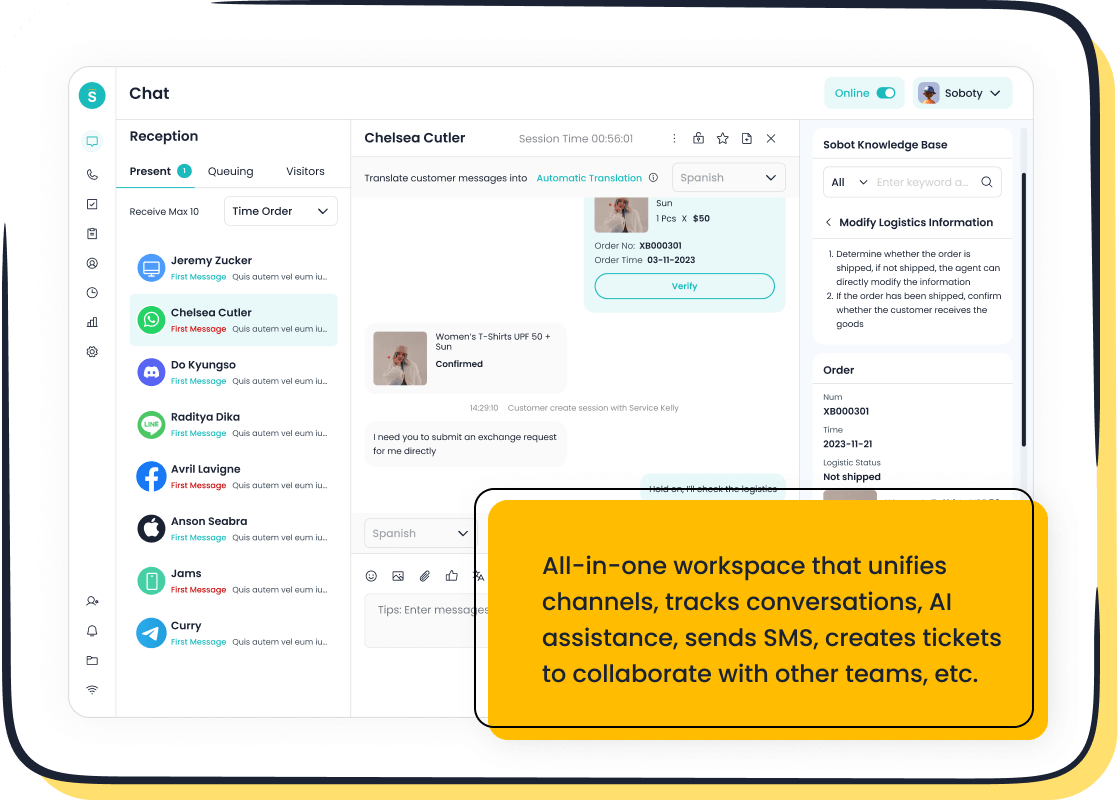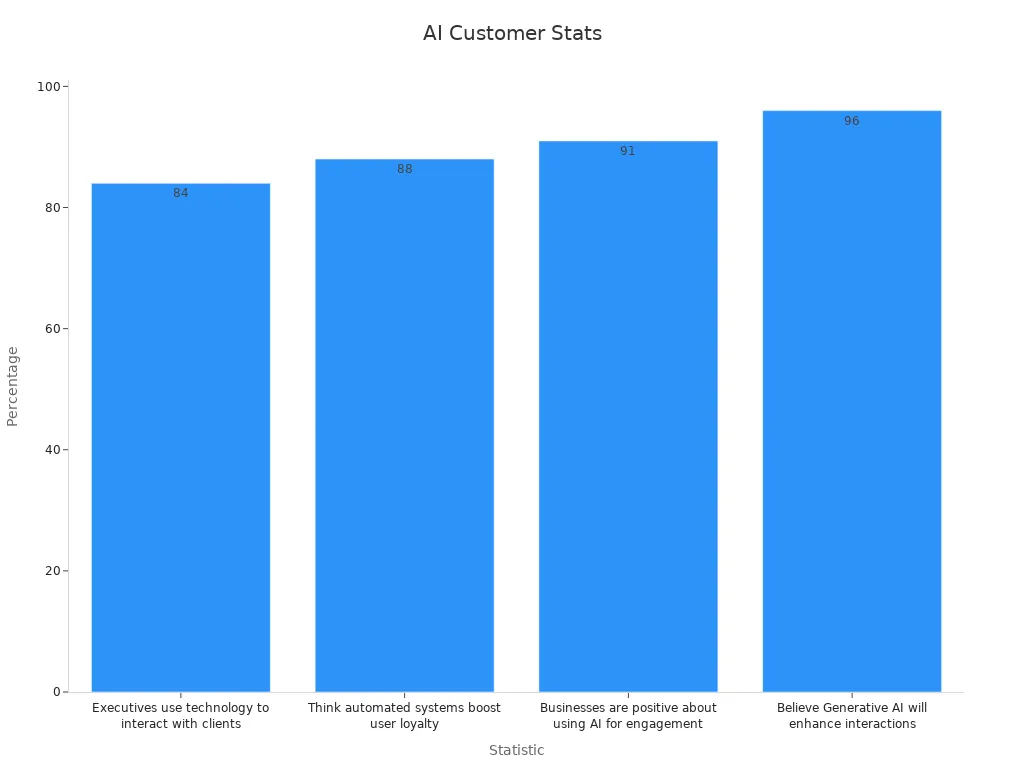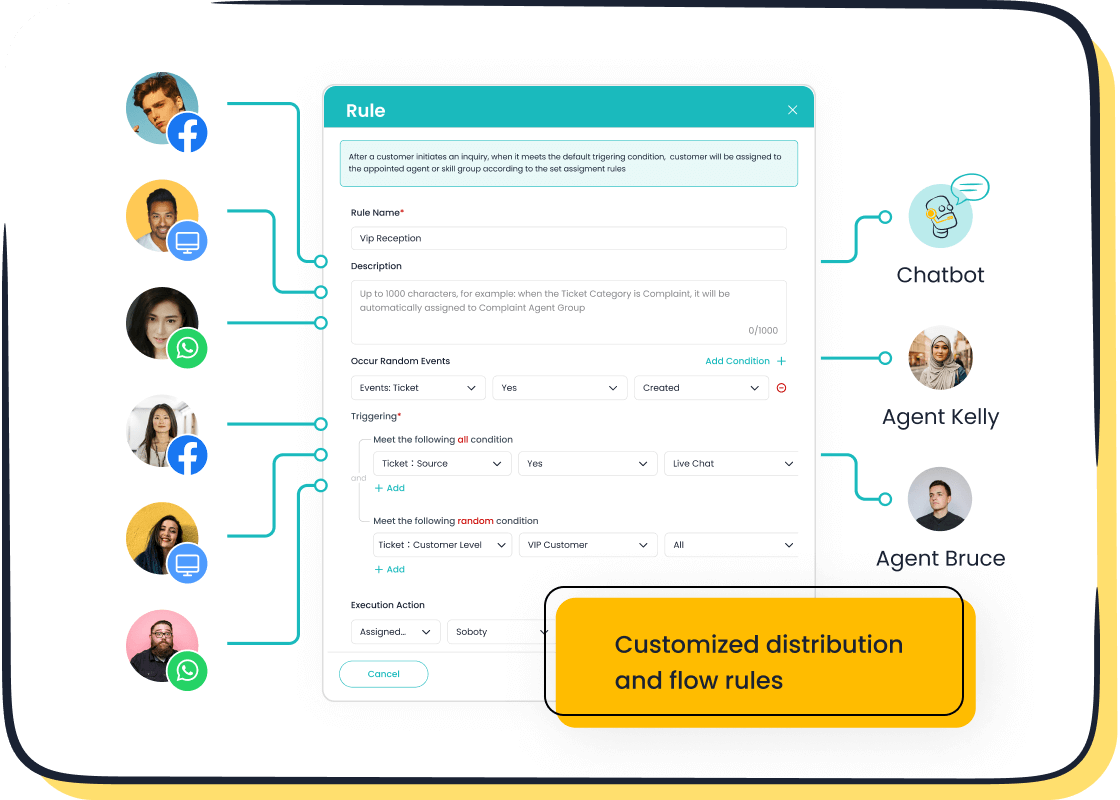Understanding AI Shopping Assistants in E-Commerce in 2025

AI shopping assistants have transformed the online shopping experience by delivering smart, interactive, and personalized solutions. Leveraging advanced technologies such as machine learning and natural language processing, these tools understand customer preferences and guide them to the ideal products. For instance, AI-powered recommendations can boost conversion rates by 25%, while intelligent cross-selling strategies increase the average order value by 35%. By 2025, the AI e-commerce market is expected to reach $4.64 billion, with 80% of online retailers integrating AI tools to maintain a competitive edge. Companies like Sobot are at the forefront of this evolution, offering cutting-edge AI assistants for e-commerce to enhance customer satisfaction and optimize operational efficiency.
What Are AI Shopping Assistants and How Do They Work?
Definition and Core Functions of AI Shopping Assistants
AI shopping assistants are intelligent tools designed to enhance your online shopping experience. These assistants use advanced technologies like machine learning and natural language processing to understand your preferences and guide you toward the right products. Their core functions include personalized product recommendations, predictive analytics, and real-time customer support. For example, product recommendation engines analyze your browsing history and suggest items tailored to your tastes, making your shopping journey more efficient and enjoyable.
These assistants also streamline operations for businesses. They automate repetitive tasks, such as answering common queries, allowing human agents to focus on complex issues. Features like inventory management and market trend identification help businesses optimize their strategies and stay competitive. According to industry data, AI adopters have seen an 87% increase in annual revenue and a 94% reduction in operational costs. This transformative impact highlights why AI shopping assistants are becoming indispensable in e-commerce.
| Feature/Function | Description |
|---|---|
| Virtual Try-On Tools | Allows customers to see how products like clothing or makeup will look on them using AR and AI. |
| Predictive Analytics | Anticipates future trends and consumer behaviors to help businesses stock the right products. |
| Faster Response Times | Provides instant responses to customer queries, improving satisfaction and reducing cart abandonment. |
| Upselling and Cross-Selling | Identifies opportunities to suggest complementary products or higher-end options during purchases. |
How AI Shopping Assistants Enhance Personalization in E-Commerce
Personalization is at the heart of AI shopping assistants. These tools analyze your behavior, preferences, and purchase history to deliver tailored experiences. For instance, AI-powered assistants can remember your favorite brands and suggest complementary items, creating a seamless shopping journey. This level of personalization not only boosts customer satisfaction but also increases loyalty and retention.
Real-world examples demonstrate the effectiveness of AI in personalization. Alibaba's FashionAI uses smart mirrors to recommend items based on RFID and computer vision, resulting in a 20% increase in average items per transaction. Similarly, SK-II's smart stores achieved an 80% conversion rate improvement by offering personalized recommendations. These success stories highlight how AI shopping assistants transform e-commerce by making every interaction meaningful and relevant.
| Company | Implementation Details | Results |
|---|---|---|
| SK-II | Smart stores with personalized recommendations | 80% increase in conversion rates, 25% boost in customer satisfaction, 30% improvement in retention. |
| Sephora | Virtual Artist AR tool | 30% increase in mobile conversion rates. |
| The North Face | AI shopping assistant | 33% increase in email sign-ups, 75% increase in time spent on site. |
The Role of Conversational AI in Customer Interactions
Conversational AI plays a pivotal role in enhancing customer interactions. These systems use natural language processing to engage with you in a human-like manner, answering queries, providing recommendations, and even assisting with purchases. For example, Sobot’s Live Chat platform integrates conversational AI to deliver instant responses across multiple channels, ensuring you receive timely and accurate support.
The benefits of conversational AI extend beyond convenience. It improves collaboration, enhances efficiency, and fosters loyalty. Statistics show that 79% of customer service specialists value AI for its ability to automate tasks, while 78% believe it helps them focus on critical aspects of their jobs. Businesses using conversational AI report a 91% positive impact on customer engagement, underscoring its importance in modern e-commerce.

Technologies Powering AI Shopping Assistants
Machine Learning and Predictive Analytics in E-Commerce
Machine learning drives the intelligence behind AI shopping assistants, enabling them to analyze vast amounts of data and predict customer preferences. By studying purchase history, browsing behavior, and demographic information, these systems curate personalized product recommendations that match your needs. For example, AI recommendation systems can anticipate seasonal trends and suggest items that align with your shopping habits. This capability not only enhances your shopping experience but also helps businesses optimize their inventory and marketing strategies.
Predictive analytics further streamlines product discovery by forecasting future trends and customer behaviors. It uses historical and real-time data to anticipate sales at product and location levels. This ensures businesses stock the right products and deliver tailored recommendations. Studies show that predictive analytics increases average order value through upselling and cross-selling strategies. For instance, product recommendation engines powered by AI have helped e-commerce platforms boost conversions by generating highly relevant offers.
| Benefit | Description |
|---|---|
| Enhanced Product Discovery | Helps customers find relevant products more easily. |
| Increased Average Order Value | Encourages upsells and cross-sells, leading to higher sales. |
Machine learning and predictive analytics are essential for streamlining product discovery and enhancing online shopping experiences. These technologies empower virtual shopping assistants to deliver tailored recommendations, making your shopping journey more efficient and enjoyable.
Natural Language Processing (NLP) for Human-Like Conversations
Natural language processing (NLP) enables AI shopping assistants to communicate with you in a way that feels natural and intuitive. By understanding context, recognizing synonyms, and tolerating typos, NLP enhances e-commerce search functionality. This ensures you find the products you need, even if your search terms aren't perfect. AI tools also support voice and visual search, allowing you to interact with digital shopping assistants in innovative ways.
Recent advancements in NLP have transformed customer interactions. Large language model (LLM)-powered chatbots now remember conversation history and understand complex queries. These improvements have reduced cart abandonment by 12% in pilot programs and increased customer satisfaction. In fact, 77% of consumers prefer brands that offer personalized experiences, highlighting the importance of NLP in e-commerce.
Gartner predicts that by 2027, LLM-powered chatbots will become the primary customer service channel. This shift underscores the growing role of NLP in enhancing online shopping experiences.
Integration with E-Commerce Platforms and Tools Like Sobot Live Chat

Integration is key to maximizing the potential of AI shopping assistants. Tools like Sobot Live Chat unify customer interactions across multiple channels, including websites, apps, and social media platforms. This omnichannel approach minimizes disjointed system issues and ensures seamless communication. For example, Sobot’s AI solutions have reduced waiting times by 35%, improving customer satisfaction and loyalty.
Sobot Live Chat also supports system upgrades, with 70% of its contact center business coming from these enhancements. Its built-in analytics evaluate over 150 indicators, helping businesses optimize their strategies. By integrating AI-powered recommendations with e-commerce platforms, Sobot enables businesses to deliver personalized product recommendations and streamline customer support.
The integration of AI assistants for e-commerce with tools like Sobot Live Chat enhances your shopping experience. It ensures you receive timely responses, tailored recommendations, and efficient support, making your journey smoother and more enjoyable.
Key Benefits of AI Shopping Assistants for Businesses and Consumers
Improving Customer Experience Through Personalization
AI shopping assistants revolutionize your shopping experience by delivering personalized recommendations tailored to your preferences. These assistants analyze your browsing history, purchase patterns, and even product reviews to create a tailored experience. For example, product recommendation engines powered by AI suggest items that match your style, saving you time and boosting confidence in your choices. Platforms like Amazon and Netflix use AI to provide hyper-personalized shopping experiences, ensuring you find exactly what you need.
This level of personalization enhances customer satisfaction and loyalty. AI shopping assistants act like traditional store assistants, guiding you to products that fit your needs. They make your shopping journey smoother and more enjoyable. Studies show that 28% of shoppers view AI shopping assistants as valuable resources, while 17% have made purchases using AI tools. These statistics highlight how AI-driven shopping transforms e-commerce into a more engaging and efficient experience.
Boosting Conversion Rates and Sales with AI Assistants for E-Commerce
AI shopping assistants significantly improve conversion rates by delivering personalized product recommendations and optimizing customer engagement. When you interact with these assistants, they use algorithms to suggest complementary items or higher-value alternatives, increasing your likelihood of completing a purchase. Research shows that users experience a 2x+ increase in purchases after engaging with AI assistants. This boost in sales demonstrates the effectiveness of AI in driving e-commerce growth.
Businesses benefit from these tools by reducing cart abandonment and increasing average order values. For instance, Sobot’s AI solutions integrate seamlessly with e-commerce platforms to deliver tailored recommendations, ensuring you find products that meet your needs. These assistants also enhance customer engagement by providing timely responses and relevant offers, making your shopping experience more satisfying. Conversion rate improvements underscore the importance of AI in modern e-commerce strategies.
24/7 Availability and Scalability for Customer Support
AI shopping assistants operate around the clock, ensuring you receive support whenever you need it. Whether you’re shopping late at night or during peak hours, these assistants provide instant responses to your inquiries. This accessibility improves customer satisfaction and reduces frustration. For example, Sobot’s Live Chat platform offers omnichannel support, allowing businesses to interact with customers across websites, apps, and social media without delays.
Scalability is another key benefit. AI solutions handle large volumes of requests without requiring additional resources, making them ideal for businesses during high-demand periods. Research highlights that AI assistants easily scale to accommodate fluctuations in customer demand while maintaining consistent service levels. This ensures you receive timely and accurate assistance, regardless of the time or volume of inquiries. Round-the-clock availability and scalability make AI shopping assistants indispensable in e-commerce.
Real-World Applications of AI Shopping Assistants in E-Commerce

AI Chatbots for Product Recommendations and Customer Support
AI chatbots simplify your shopping experience by offering personalized recommendations and handling customer inquiries. These intelligent assistants perform tasks like placing orders, tracking shipments, and managing refunds. For example, Nike uses AI-powered chatbots to provide 24/7 support, ensuring you receive timely assistance. Similarly, Nordstrom’s AI chatbots recommend products and schedule appointments with stylists, enhancing customer engagement.
With AI-powered software, you can snap a product image and instantly find similar items available for purchase. This feature ensures excellent support across chat, email, and social media channels, making your shopping journey seamless.
AI chatbots also boost sales by upselling and cross-selling during purchases. Case studies show that personalized deals suggested by chatbots have increased average order value by 40% and conversion rates by 35%. These results highlight the transformative impact of AI shopping assistants on e-commerce.
| Company | Application | Description |
|---|---|---|
| Amazon Go | Cashier-less store | Utilizes cameras and sensors to track purchases, eliminating checkout lines. |
| Nike | AI-powered chatbots | Provides 24/7 customer support for inquiries and issues. |
| Nordstrom | AI-powered chatbots (Nordstrom Stylists) | Answers customer questions, recommends products, and schedules appointments with human stylists. |
Virtual Shopping Assistants for Guided Purchases
Virtual shopping assistants help you make confident purchase decisions by narrowing down options through targeted questions. For instance, expectant parents choosing strollers benefit from guided selling, which simplifies the selection process. These assistants analyze your preferences and provide personalized recommendations, increasing the likelihood of purchases.
Virtual shopping assistants also reduce lost sales opportunities by offering immediate assistance during your shopping journey. They ensure you find the right products quickly, improving satisfaction and boosting conversions. Studies show that guided selling increases customer confidence and reduces decision fatigue, making virtual shopping assistants indispensable in e-commerce.
Sobot Live Chat as a Unified Solution for Customer Engagement
Sobot Live Chat combines AI-powered tools with omnichannel support to enhance customer engagement. It allows businesses to interact with you across websites, apps, and social media platforms, ensuring seamless communication. The platform’s AI-assisted features provide personalized product recommendations, helping you discover items that match your preferences.
Sobot Live Chat also improves efficiency by automating responses and analyzing over 150 indicators to optimize service. Its integration capabilities connect customer records and business systems, enabling agents to deliver timely and accurate support. With features like auto-translation and satisfaction surveys, Sobot Live Chat ensures your shopping experience remains smooth and enjoyable.
Learn more about Sobot Live Chat’s capabilities here.
Future Trends and Advancements in AI Shopping Assistants by 2025

The Rise of Multimodal AI for Seamless Shopping Experiences
Multimodal AI is transforming how you interact with e-commerce platforms. It combines text, voice, and image recognition to create a more interactive and intuitive shopping experience. For example, you can now search for products by uploading an image or using voice commands, making your journey faster and more convenient. Virtual try-ons, powered by augmented reality, are becoming mainstream, allowing you to preview apparel or accessories in real time. This trend enhances your confidence in purchasing decisions.
The global multimodal AI market is projected to grow from $1.0 billion in 2023 to $4.5 billion by 2028, with a compound annual growth rate of 35%. This growth reflects the increasing demand for AI systems that analyze unstructured data and perform complex tasks. Features like hyper-localized offers and voice-first commerce are also gaining traction, particularly in regions like India, where they democratize access to e-commerce.
Integration with Augmented Reality (AR) and Virtual Reality (VR)
AR and VR are revolutionizing virtual shopping assistants by creating immersive experiences. Imagine walking through a virtual store or trying on clothes without leaving your home. These technologies, combined with AI, analyze your preferences to personalize these virtual environments. For instance, tailored recommendations based on your style or size enhance engagement and satisfaction.
Industry forecasts predict significant growth in the virtual shopping assistant market due to the integration of AI, AR, and VR. Statista estimates the global AI market will reach $126 billion by 2025, driven by advancements in these technologies. Retailers are leveraging this integration to offer unique experiences, such as virtual fitting rooms, which reduce returns and improve customer loyalty.
Ethical AI and Data Privacy in E-Commerce
As AI becomes more prevalent in e-commerce, ethical practices and data privacy are critical. You want to trust that your data is handled responsibly. Companies are adopting transparency and explainability to build this trust. For example, AI systems now provide clear insights into how recommendations are generated, addressing concerns about bias or discrimination.
Responsible data handling is essential for compliance with privacy regulations like GDPR. According to PwC, 85% of consumers hesitate to engage with companies if they doubt their security practices. Ethical AI also ensures fairness by mitigating algorithmic bias. These practices not only protect your data but also enhance your confidence in using AI-powered tools.
| Ethical AI Practice | Impact on E-commerce |
|---|---|
| Transparency and explainability | Builds trust and addresses concerns about bias or discrimination |
| Responsible data handling | Ensures compliance with privacy regulations and protects consumer information |
| Mitigating bias | Promotes fairness and inclusivity in AI systems |
How to Integrate AI Shopping Assistants into Your E-Commerce Strategy
Assessing Business Needs and Choosing the Right Tools
Integrating AI shopping assistants into your e-commerce strategy begins with understanding your business needs. Start by identifying areas where AI can add value, such as improving customer support, enhancing personalization, or streamlining operations. For example, Amazon uses AI to personalize shopping experiences and optimize its supply chain, while Alibaba employs AI for fraud detection and customer service. These applications demonstrate how AI can address specific challenges and create opportunities for growth.
To choose the right tools, evaluate platforms that align with your goals. Look for solutions that offer scalability, omnichannel support, and advanced analytics. By 2025, 84% of e-commerce businesses will prioritize AI solutions, highlighting the importance of adopting technologies that meet industry standards. Tools like Sobot Live Chat provide omnichannel support and AI-powered features, making them ideal for businesses seeking to enhance customer engagement and operational efficiency.
Leveraging Sobot AI Solutions for Omnichannel Support
Sobot AI Solutions offer a comprehensive platform to unify customer interactions across multiple channels. Whether customers reach out via websites, apps, or social media, Sobot ensures seamless communication. Its AI-powered tools reduce inbound discussion volume by 20% and achieve a 96% positive feedback rate. With over 80% accuracy in responses, Sobot enhances customer satisfaction and streamlines problem resolution.
| Metric | Result |
|---|---|
| Reduction in inbound discussion volume | 20% |
| Increase in positive feedback | 96% + |
| Correct answers provided by AI | Over 80% |
| Customer satisfaction rate | Over 95% |
| Self-service question resolution | 22.2% |
| Customer satisfaction score (CSAT) | 97% |
| Problem resolution rate | 85% |
| Customer happiness rate | 99% |
Sobot’s omnichannel approach ensures customers receive timely and accurate support, regardless of the platform they use. Its built-in analytics evaluate over 150 indicators, helping businesses optimize their strategies and improve customer experiences. By leveraging Sobot AI Solutions, you can deliver personalized recommendations and scale operations efficiently.
Training and Optimizing AI Systems for Maximum Impact
Training your AI systems is essential for maximizing their impact. Begin by providing high-quality data to ensure accurate predictions and responses. Focus on metrics like accuracy, customer engagement, and personalization effectiveness to measure performance. For instance, AI systems that tailor experiences to individual users enhance satisfaction and retention.
Optimization involves continuous monitoring and updates. Analyze customer feedback and sentiment to identify areas for improvement. Sobot AI Solutions excel in adaptability and scalability, allowing businesses to adjust to new data and scale operations seamlessly. Metrics like return on investment (ROI) and data quality highlight the financial and operational benefits of well-trained AI systems.
| Metric | Description |
|---|---|
| Accuracy and Precision | Measures how correctly the AI system predicts outcomes, crucial for effective decision-making. |
| Customer Engagement | Assesses how well the AI interacts with customers, impacting retention and satisfaction. |
| Personalization Effectiveness | Evaluates the AI's ability to tailor experiences to individual users, enhancing user experience. |
| Return on Investment (ROI) | Analyzes the financial returns from AI initiatives, justifying investments in AI technologies. |
| Data Quality and Integration | Focuses on the accuracy and completeness of data used by AI, essential for reliable performance. |
| Adaptability and Scalability | Measures how well the AI can adjust to new data and scale with business needs. |
| Customer Feedback and Sentiment Analysis | Gathers insights from customer opinions to improve AI systems and marketing strategies. |
By training and optimizing AI systems, you can ensure they deliver maximum value to your e-commerce strategy. This approach enhances customer satisfaction, drives sales, and supports long-term business growth.
AI shopping assistants have revolutionized e-commerce by delivering personalized experiences, intuitive interactions, and 24/7 support. These tools enhance user engagement through machine learning, natural language processing, and augmented reality, helping you find products faster while improving satisfaction. The market for AI shopping assistants is projected to grow at a CAGR of 24.3%, reaching $14.1 billion by 2030, reflecting their rising demand.
Adopting AI solutions like Sobot Live Chat ensures your business stays competitive. With omnichannel support and AI-powered tools, Sobot streamlines customer engagement and boosts efficiency. By integrating these technologies, you can deliver tailored experiences, reduce operational costs, and meet evolving consumer expectations. Explore Sobot’s solutions to transform your e-commerce strategy today.
FAQ
What are AI shopping assistants, and how do they benefit you?
AI shopping assistants are intelligent tools that personalize your shopping experience. They analyze your preferences, recommend products, and provide instant support. For example, Sobot Live Chat uses AI to deliver tailored recommendations, boosting conversion rates by 38% and improving customer satisfaction.
Can AI shopping assistants work across multiple platforms?
Yes, AI shopping assistants like Sobot Live Chat offer omnichannel support. They integrate with websites, apps, and social media platforms like WhatsApp and Instagram. This ensures seamless communication and consistent service, no matter where you shop.
How do AI shopping assistants improve customer support?
AI shopping assistants provide 24/7 support, answering questions instantly. They handle repetitive tasks, allowing human agents to focus on complex issues. For instance, Sobot’s AI solutions reduce waiting times by 35%, ensuring faster and more efficient service.
Are AI shopping assistants secure and compliant with data privacy laws?
Yes, reputable AI solutions prioritize data security. Sobot AI complies with GDPR, uses data encryption, and performs continuous encrypted backups. These measures protect your information and ensure compliance with global privacy regulations.
How can businesses integrate AI shopping assistants into their strategy?
Businesses can start by identifying areas for improvement, such as customer support or personalization. Tools like Sobot Live Chat offer easy integration with existing systems, built-in analytics, and AI-powered features to enhance customer engagement and operational efficiency.
See Also
Enhancing Operational Efficiency With AI Customer Support Tools
Increasing Customer Satisfaction Through E-commerce Chatbot Solutions
Comprehensive Overview of AI Solutions for Call Centers
Evaluating AI Solutions for Enterprise Call Center Operations
